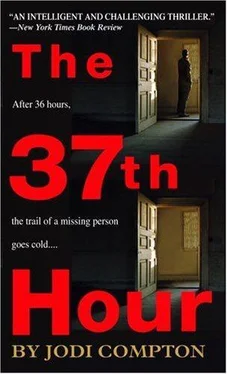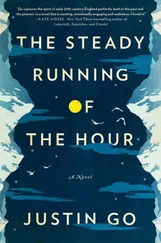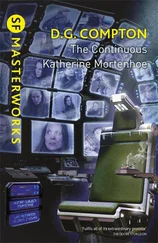Radich nodded slowly, thinking. “What have you done so far?”
“Less than I thought I’d get done in one day,” I said. “I’m putting together the paper trail. Interviewing neighbors. And”- I disliked even saying it-“I just went to the morgue.”
On the other side of the kitchen wall, a noise like earthbound thunder boomed, a sequential reverberation. Radich looked up.
“What the hell was that?” he said.
“A train,” I said. “They’re putting a freight together up at the yards. When they hook cars up, you can hear the impact travel down the rest of the train. Like vertebrae of a spine.”
“You get used to that?”
“It doesn’t happen all that often,” I said. “But the trains run right past our backyard several times a day. More than several. I’m used to it, and Shiloh even likes it, he says.”
“Were you in the morgue looking at an unidentified body?” he asked, returning to the subject at hand.
“Yeah,” I said. “It wasn’t him.”
Radich drank the last of the Heineken before he spoke again. “Why’d they call you? They couldn’t fingerprint?”
“I guess not,” I said. “This forensic assistant said the fingerprints were-” I stopped to retrieve the exact word from my memory. “He said something about the fingerprints not being useful.”
“Why not?”
“I… I don’t know.” It had seemed reasonable at the time. I hadn’t questioned Rossella, I suppose, because I’d been so damn afraid that this was it, the end, that I hadn’t been thinking logically. “He said something about exposure or the body being outside.”
Radich shook his head, slowly. “I know forensics isn’t your line, it’s not mine, either, but I do know that they can almost always print. Sometimes in real hot, dry conditions the skin gets unprintable, I’ve heard of that.”
“Well, that wasn’t the case here,” I said slowly, seeing the right hand again as I checked for the scar Annelise Eliot had left there.
“Tough on you, to have to go down there for nothing,” Radich said, dismissing the issue. He started packing up the trash into the deli bag.
“I’ll clean up,” I said, waving him off. “I really appreciate the dinner.”
Radich stood. “I know you’ve got my phone number downtown,” he said, taking a pen from his jacket, “but I don’t think you’ve got my home number.” He cast a glance around the table, saw the pale peach take-out menu of the deli he’d gotten the sandwiches from, and wrote on the margin of it. When he handed the menu to me, there were two numbers on it. “Home and cell,” he said. “If you need anything, any help… or more food”-his mouth quirked slightly at the corner, not quite smiling, like he was worried even a small joke wasn’t right given the circumstances-“you call me.”
“Thanks,” I said. “Really, thanks.” I didn’t know what else to say.
“Hang in there, kid.”
“I’m trying,” I said.
“We all feel for you.”
His black eyes were warm with compassion. Radich had been a cop too long to suggest that everything was going to be all right.
I went by work the following morning. Vang was already in.
“Any news, Pribek?” he asked.
I shook my head. “Nothing,” I said. “It’s making me kind of crazy. Nobody knows anything. Nobody’s seen him.”
It was true. I’d collected faxes from Qwest and the bank, which I was looking over. The only number on our phone bill that I hadn’t identified right away I’d called, and it had turned out to be the prosecutor’s office in San Diego. The lead lawyer on the Eliot case, Coverdell, had explained that Shiloh had answered a few questions about the investigation.
“When did you speak with him last?” I’d asked Coverdell.
“Over a week ago. I don’t remember the day,” he had said.
Vang picked up his phone, dialed, and listened with the receiver held against his shoulder. He said nothing, only wrote on a pad. Checking his messages.
When he hung up, he said, “Prewitt wants to see you.”
“He does?” I glanced up, searching Vang’s face for implications. Prewitt was our lieutenant. “Did he say why?”
“It’s about your husband, I figure. What he said was ‘When you see her, ask her to come see me.’ It didn’t sound urgent. If I were you, though, I’d catch him now, while he’s in.” He paused. “Bonney turned up, by the way.”
I must have looked blank, because Vang said, “You know, the Wayzata sex offender? Turned out he’d switched shifts with a coworker who’d needed a day off later in the week, so his absence from work was totally innocent.”
“Yeah?” I said without interest.
“Admitted to hitting and burying the dog, too. Cried when he told us about it-um, you want to be left alone, don’t you?”
“Sorry,” I said, looking up. The faxes had recaptured my attention. “I’m kind of distracted right now.”
Vang nodded. “Well,” he said. “I should go, then. The missing-child task force is meeting.”
“Oh, yeah.” Were I not on leave, I’d be going, too, as Genevieve would have.
But Vang’s voice told me he wasn’t finished, and again I looked up from my paperwork. “What?”
“Look, Prewitt got in touch with the medical examiner,” he said. “He told him about the situation. You might be getting a call if they’ve got a likely John Doe in the morgue.”
“I already did.”
“Really?” Vang said. “That was fast. I should have called you last night and warned you.”
“Don’t worry about it,” I said.
But it was too late. I’d managed to put Rossella out of my mind, but suddenly he was a figure on my mental landscape again. I thought about the way he’d called me Mrs. Shiloh when we were in the morgue, not Detective Pribek, and his private smile after he’d thanked me for coming in.
The sergeants to whom I’d answered in my career generally had to move stuff off their spare chair before someone could sit down: manila folders, papers.
Lieutenant Prewitt had a real office, although a small one, and his guest chair was vacant. He had audiences often. Genevieve had reported to him; I did now, in her absence. But since taking over her responsibilities, I hadn’t really had the opportunity or need to talk to Prewitt.
“You wanted to see me?” I said, standing in his open door.
Prewitt looked up from his work. He was a young 55, with all his hair yet. It was salt-and-paprika now, instead of the carroty red I’d seen in pictures of him in his uniformed days.
“Please,” he said. “Come in and sit down.”
I did as he asked.
“I saw your report,” he said. “Tell me what’s going on.”
I ran a hand through my hair, a gesture I thought I’d outgrown, and summarized.
“Shiloh was supposed to leave for Quantico on Sunday on a two-thirty flight,” I said. “He never made it. His things are still at the house. He hasn’t called, he left no note. I’ve checked the usual sources-hospitals, the highway patrol-and haven’t found any suggestion of an accident.”
Prewitt nodded. “Have you talked to his friends?”
“I’ve spoken to Genevieve recently-I mean Detective Brown-and I’m sure she hasn’t talked to him. And Shiloh was kind of tight with Lieutenant Radich, but he hasn’t heard anything, either.”
“Those are the only people you asked?”
“Well, no,” I said. “I spoke to the FBI agent he worked with on the Eliot case, and neighbors, of course.” It didn’t sound like a whole lot of people, now that I thought about it. I chewed a bit of dry skin on my lower lip. “Shiloh wasn’t…”
“He wasn’t what you’d call real sociable, was he, Detective Pribek?” Prewitt said.
Читать дальше












